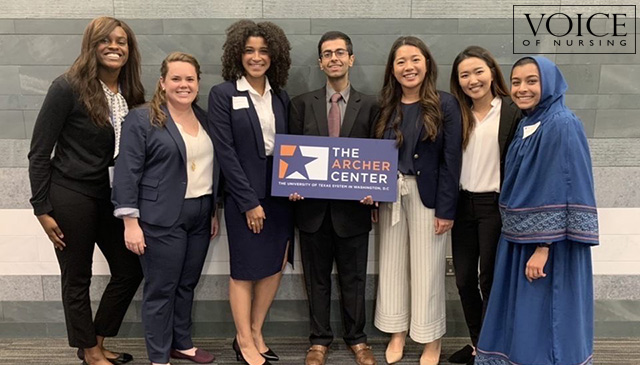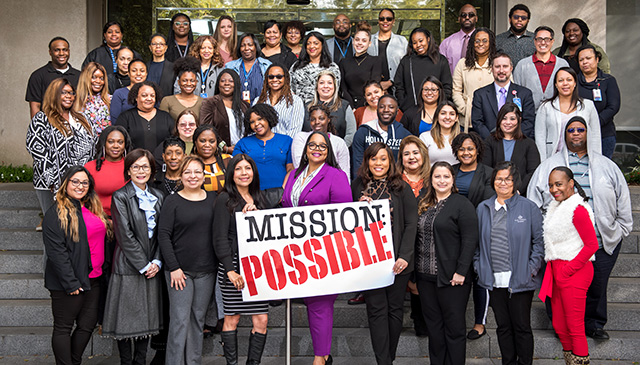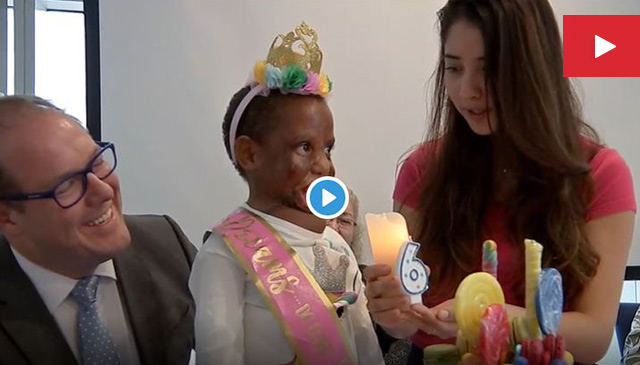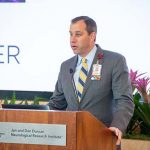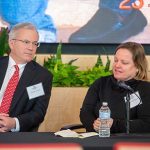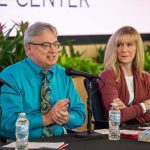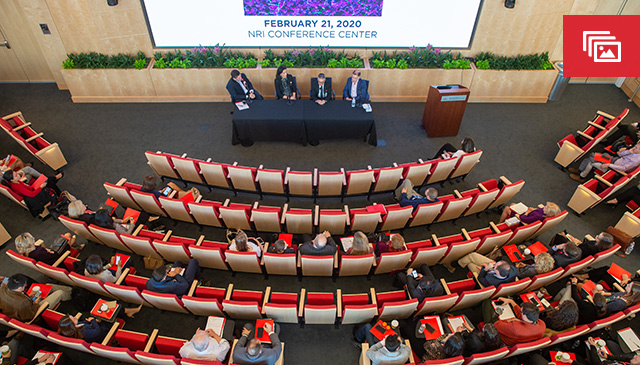
Texas Children’s Neurosciences Program is all about improving patient outcomes. Every day, our team of neurologists, neurosurgeons, geneticists, physician-scientists and researchers are working together tirelessly to pioneer innovative therapies to improve the lives of children with neurological disorders.
On February 21, neuroscience leadership at Texas Children’s together with faculty and staff convened for the inaugural Neurosciences Retreat at the Jan and Dan Duncan Neurological Research Institute (NRI). This informative and engaging event provided our multidisciplinary team of neurologists, neurosurgeons, clinicians, researchers, behavioral health experts, and more the opportunity to reflect on past successes, discuss areas of possible improvement, identify transformative goals and actively plan for the future.
After welcome remarks from Executive Vice President Dan DiPrisco, the retreat began with a moderated panel discussion with two patient families who shared their inspiring stories that brought them to Texas Children’s Hospital. One of the guests was Debbie Sukin, the daughter of the late Dr. Ralph D. Feigin.
Sukin’s two sons, 18-year-old Jacob and 15-year-old Eli, were born with neurological challenges. Jacob was diagnosed with Angelman’s syndrome and Eli was diagnosed with a very rare neurological disorder caused by a CASK gene mutation diagnosed through genome DNA sequencing at Texas Children’s Hospital and Baylor College of Medicine.
“Texas Children’s holds a very special place in my family’s heart,” Sukin said. “We always knew about the hospital’s focus on clinical care and research, and didn’t quite know at the time that it would be so beneficial and important to our family. We are very much involved, on both the basic science and clinical sides, and the multidisciplinary components that are necessary to care for a child with neurological issues.”
The Sukin family’s journey, like so many other patient family stories shared at the retreat, highlight our clinical and research partners’ collaborative efforts in advancing neuroscience research, ultimately leading to the development of novel treatments and discovery of cures for neurological disorders.
“We’re always striving to do things better, and I think this retreat is one step towards getting us there,” said Texas Children’s Chief of Neurosurgery Dr. Howard Weiner. “Everyone here is ready to embrace a new idea if it’s going to advance the field forward. The key to our success is the ability for everyone – in Neurosurgery and our amazing colleagues in Neurology and the NRI – to work together for our patients.”
Weiner, along with Dr. Gary Clark, chief of Neurology and Developmental Neuroscience, and Dr. Huda Zoghbi, director of the NRI, participated in a panel discussion that highlighted the organization’s bench-to-bedside achievements in neuroscience research and neurological care over the last 20 years, and outlined collaborative opportunities to accelerate innovation and research to improve patient outcomes.
“We’re entering the renaissance of neuroscience in pediatrics,” Clark said. “Neurology and neurosurgery are not the same programs they were five or 10 years ago. Neurological diseases that we thought for years were not treatable, have become approachable with new DNA therapies, enzyme replacement therapy to treat lysosomal disorders, and minimally-invasive surgical approaches like laser ablation, that was pioneered at Texas Children’s, and has yielded successful outcomes for treating epileptic seizures.”
The panel also discussed strategies to ensure a seamless flow from bench to bedside, that will help researchers accelerate the discovery behind the causes of neurological diseases so that effective therapeutic interventions can be developed to improve the quality of life and outcomes for patients.
“At the NRI, our teams have identified the causes of about 66 different neurological disorders, some degenerative, others developmental or psychiatric, and have identified the path for therapeutics,” Zoghbi said. “Together, with our collaborators and trainees, we are charting new paths towards viable therapies that will have an immeasurable impact on families suffering from unexplainable neurological diseases.”
After the panel discussions, attendees split up into pre-selected breakout groups. The teams chose their groups based on the topic, and were tasked with helping to establish neuroscience goals and collectively chart the path for treatments, discoveries and cures to be realized over the next five years
The breakout groups facilitated lively discussion and engagement around these topics:
- Operational Excellence: Facilitating support for clinical care and research
- Translating Discoveries to Therapies: Overcoming barriers in order to accelerate the translation of research discoveries into effective patient care and better outcomes.
- Population Health: Strategizing on how to deliver better care to the large population of people with neurological diseases in Texas by preparing and empowering pediatricians to handle straightforward simple cases so Texas Children’s experts have band width to see more complex cases promptly.
- Educating for the Future: Training the next generation of physicians, physician-scientists and scientists who will care for patients, enroll them in studies, push the research forward to discover new paths for interventions.
- Research Funding: Increasing NIH funding to support the basic, clinical and training missions and to advance the agenda of discovery and therapeutics development.
“One of our goals coming into this retreat was to simply facilitate discussions,” said Senior Vice President Matthew Girotto. “We have world renowned clinical and research teams that, too often, do not connect with each other. By simply bringing everyone together, we were able to uncover several opportunities that could not only help accelerate discovery to improve patient care but also increase our collaboration with Texas Children’s Pediatrics in addressing many of the common neurological needs of children.”




